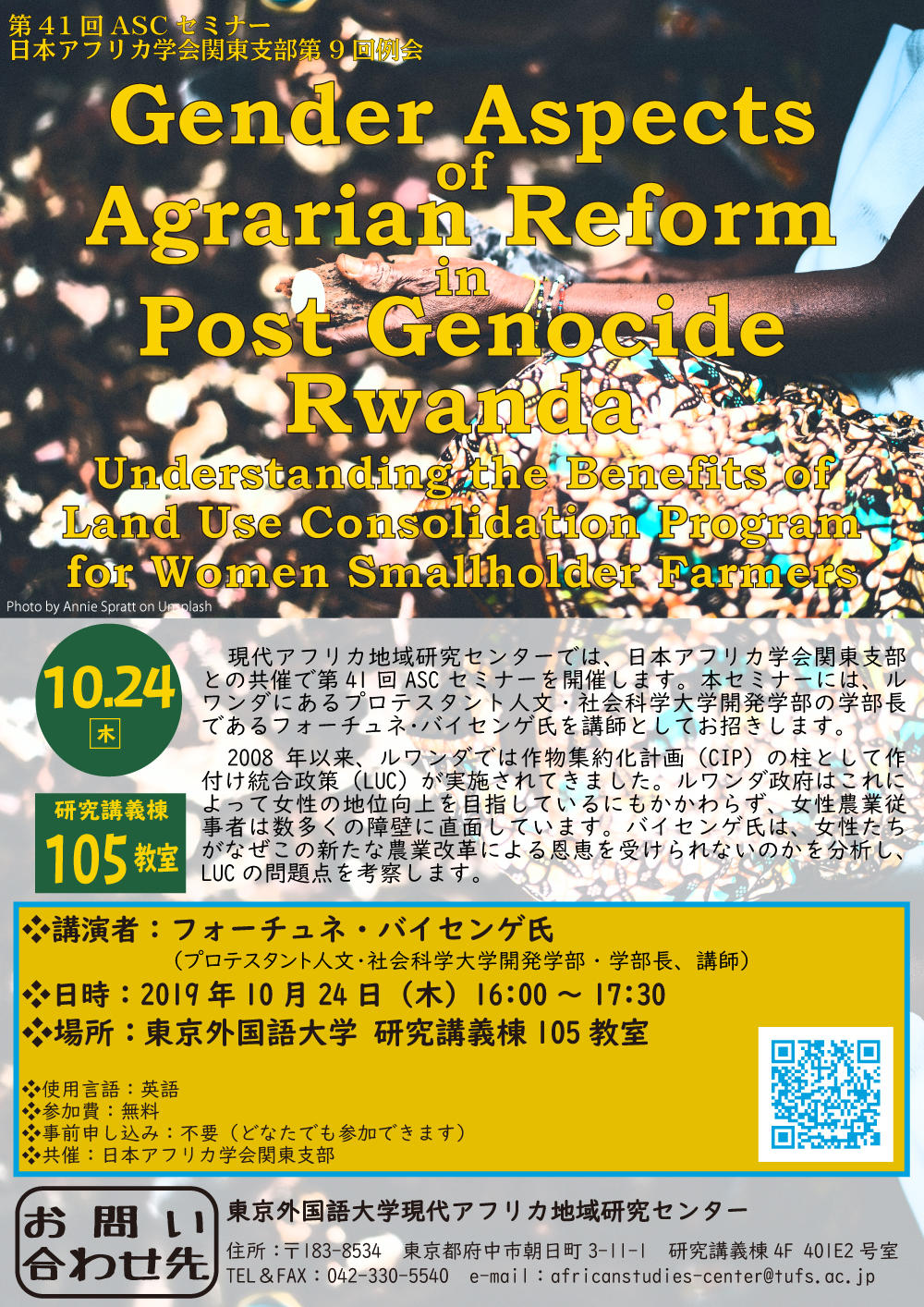現代アフリカ地域研究センターでは、日本アフリカ学会関東支部との共催で第41回ASCセミナーを開催します。本セミナーには、ルワンダにあるプロテスタント人文・社会科学大学開発学部の学部長であるフォーチュネ・バイセンゲ氏を講師としてお招きします。
2008年以来、ルワンダでは作物集約化計画(CIP)の柱として作付け統合政策(LUC)が実施されてきました。ルワンダ政府はこれによって女性の地位向上を目指しているにもかかわらず、女性農業従事者は数多くの障壁に直面しています。バイセンゲ氏は、女性たちがなぜこの新たな農業改革による恩恵を受けられないのかを分析し、LUCの問題点を考察します。
◆演題:Gender Aspects of Agrarian Reform in Post Genocide Rwanda: Understanding the Benefits of Land Use Consolidation Program for Women Smallholder Farmers
◆講演者:フォーチュネ・バイセンゲ氏(プロテスタント人文・社会科学大学開発学部・学部長、講師)
◆要旨:Over the last decade, agriculture intensification was highlighted as a strategy for boosting agriculture productivity and poverty reduction in sub-Saharan Africa. One of the issues which has been recommended for the success of this agrarian change is the empowerment of women as they constitute the majority of those involved in subsistence agriculture. Rwandan Government implemented Land Use Consolidation (LUC) since 2008 as the key pillar of Crop Intensification program (CIP). Despite consistent efforts by the Rwandan Government in promoting women's status and achieving gender equality across all sectors, women farmers are still facing constrains which limit their productive capability. As they are practicing subsistence agriculture, they have low access to agricultural inputs such as modern seeds and fertilisers, agriculture market and finance, access and control over land and related property, and high level of illiteracy. Since the implementation of LUC, official assessments affirmed its contribution to agricultural productivity whereby yields of selected crops such as maize, beans, wheat, cassava, Irish potatoes and soybeans have gone up more than three times between 2008 and 2012.The aim of this research is to investigate the benefits of LUC for women smallholder farmers in Rwanda. The study used focus group discussions and semi structured interviews to collect data from women smallholders, agricultural officials, and women representatives in District Councils of Gisagara and Nyaruguru District in the Southern Province. Research findings revealed that, though women small farmers have accessed agricultural inputs under LUC and managed to increase the production of the selected crops, they still face a number of barriers which hinder their benefits from the new agrarian change. Those include namely limited opportunities to access trainings in modern farming techniques and agriculture finance, especially for those involved in growing food crops. Being a top down and state driven program, women smallholders encountered limited autonomy in decision making under LUC regarding the selection of crops to grow and the market for selling their production. In addition, gender dynamics within farmer's households constrain women's benefits from this agrarian change. In short, the findings illustrates how the intersection of gender dynamics and the class of women farmers is overlooked by the program, and yet pulls down the benefits of women small farmers from the new Rwandan agrarian change.
◆キーワード:gender, land use consolidation, agriculture modernization, women empowerment
◆日時:2019年10月24日(木) 16:00~17:30
◆場所: 東京外国語大学 研究講義棟105教室
◆使用言語:英語
◆参加費:無料
◆事前申し込み:不要(どなたでも参加できます)
◆共催:日本アフリカ学会関東支部


